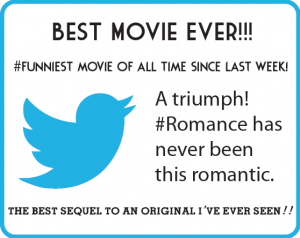Executives turn to Twitter for reviews

August 22, 2013
It seems that Hollywood has been playing fast and loose with the term “credible” lately. So for the record, I wanted to pull the definition from Merriam-Webster online:
Credible (cred-i-ble) adjective. ’kre-de-bel
1 : offering reasonable grounds for being believed
Advertisement
2 : of sufficient capacity to be militarily effective
Now that we’ve established that, consider this: Studios such as Warner Bros. and Sony have recently taken to Twitter to provide reviews for summer blockbusters like “We’re the Millers” and “White House Down.” In fact, one Twitter user referred to “House” as the best movie ever, and this review was pulled and used in a TV spot.
I don’t know this Twitter tweeter. And he/she most likely does not have a body of work online that I can review in order to appropriately determine whether or not I agree with him/her.
Let’s be real. Ignoring the fact that the chance of “White House Down” being the best movie ever in a universe where films such as “Citizen Kane,” “To Kill a Mockingbird,” “Psycho,” and “Singin’ in the Rain” exist is about as likely as my parents’ cats becoming president and vice president of the United States, how can I even begin to believe a review when the person’s real name isn’t even listed in the commercial? All I see is the Twitter handle.
We live in an era where hyperbole is prized over a genuine message. I understand that Sony has to sell “White House Down” as a breezy, buddy action movie, but the commercials move so quickly that you might as well not be able to see the name. And no matter how I may feel about “White House Down,” there were critics who enjoyed it.
However, the Twitter reviews underscore a more pertinent issue: truth in advertising. As an aspiring film critic, I view my credibility as key. If I pumped up a movie to be something that it isn’t, then I’m certainly not being fair to the reader. Critics have a troubling tendency to declare something “the funniest movie of the summer!” two weeks into summer.
The sad truth is that our tendency to want to be the biggest and best is what drives us to write such definite statements. We almost encourage people to use such terms because we keep upping the ante. But terms loose their impact the more writers try to force them upon the public. “The best movie of the summer” is meaningless when every movie is the best movie of summer. We have to find a happy medium; the minute a film critic sells out they contribute to decline in relevancy of the profession in general.
Advertisement*
Studios: If the reviews stink for your movie, you have to stick to your main selling points. It’s not fair to use reviews you randomly pull from Twitter — you are doing your customers a disservice. “White House Down”’s audience already has been determined: it’s the people who like Channing Tatum. It’s the people who like Jamie Foxx. It’s the people who like action movies. And because “House” didn’t effectively market these three, the movie became a dud.
Just because your audience is determined doesn’t mean you can count on their participation. The core audience of teenage boys who would see “House” already have been inundated with action movies. Box office potential is quite fluid in our economy, so beyond the seemingly impenetrable run of Marvel movies like “The Avengers” and “Iron Man 3,” there’s no such thing as a sure thing. Even “Thor: The Dark World” faces uncertain box office prospects.
Bottom line: effective marketing doesn’t mean you have to pander. Just because we have such easy access to social media doesn’t automatically make things people say valid. So instead of outsourcing the rout reviews to Twitter followers who may/may not have been intoxicated when they wrote their stunning 140-word review declaring “Grown Ups 2” comedy genius, maybe critics and studios need to use the state of things as a teachable moment.
Karsten Burgstahler can be reached at [email protected], on Twitter @kburgstahler_DE or by phone at 536-3311 ext. 254.
Advertisement






